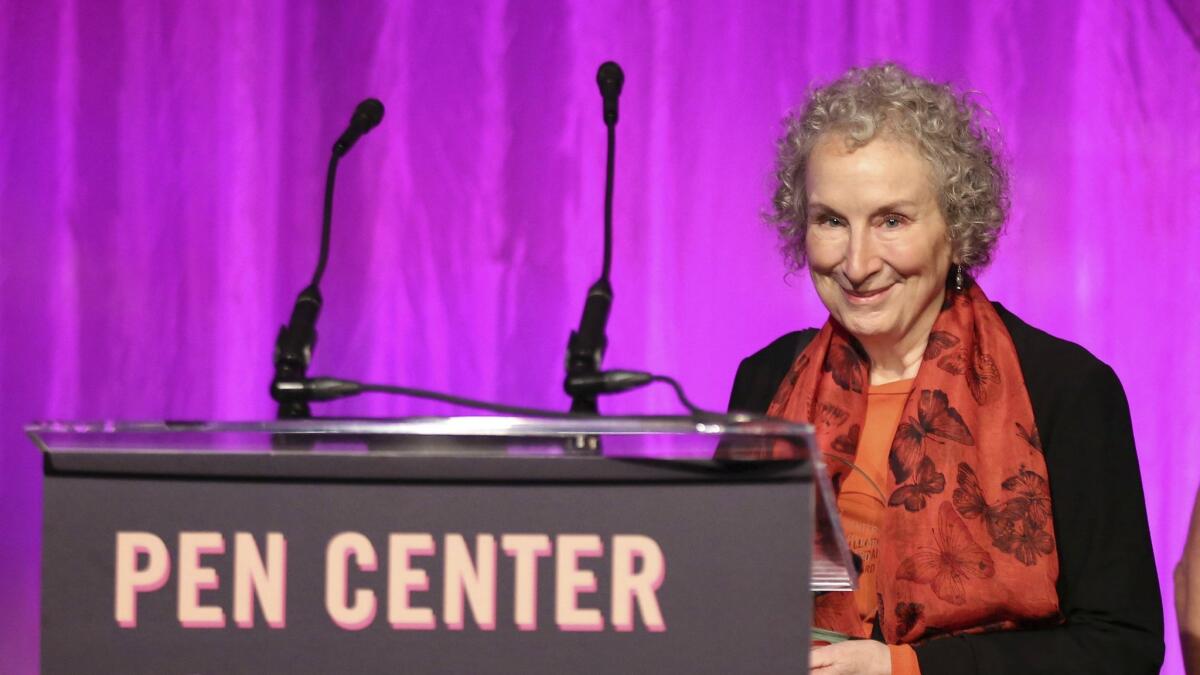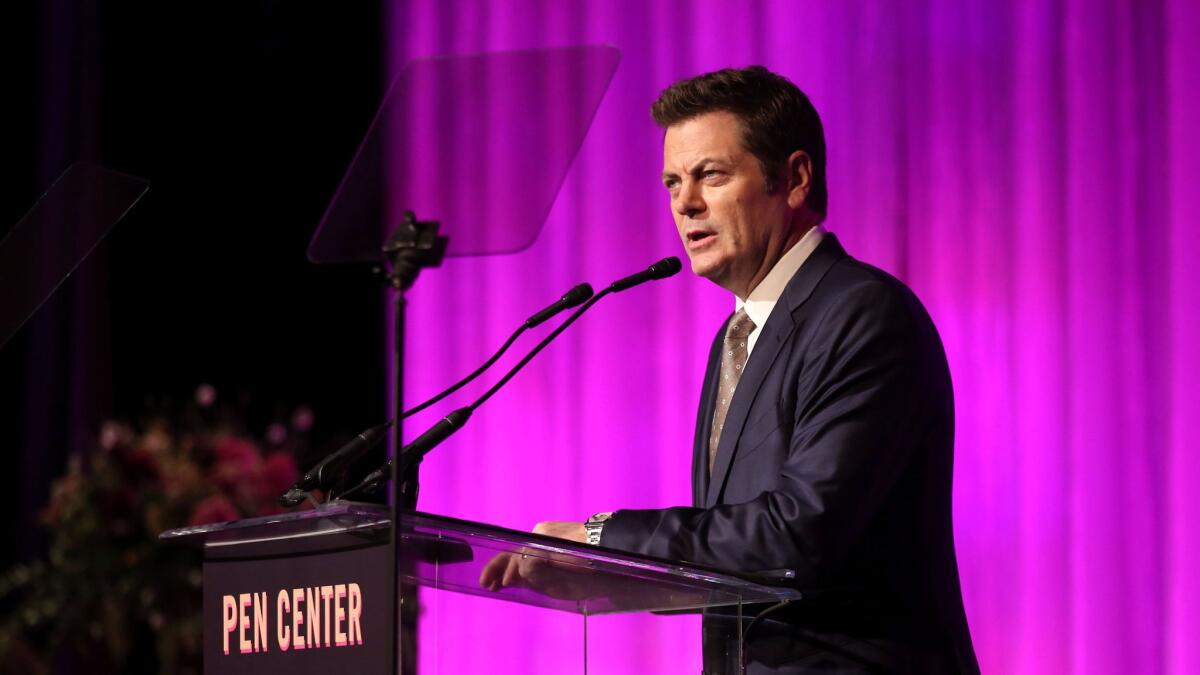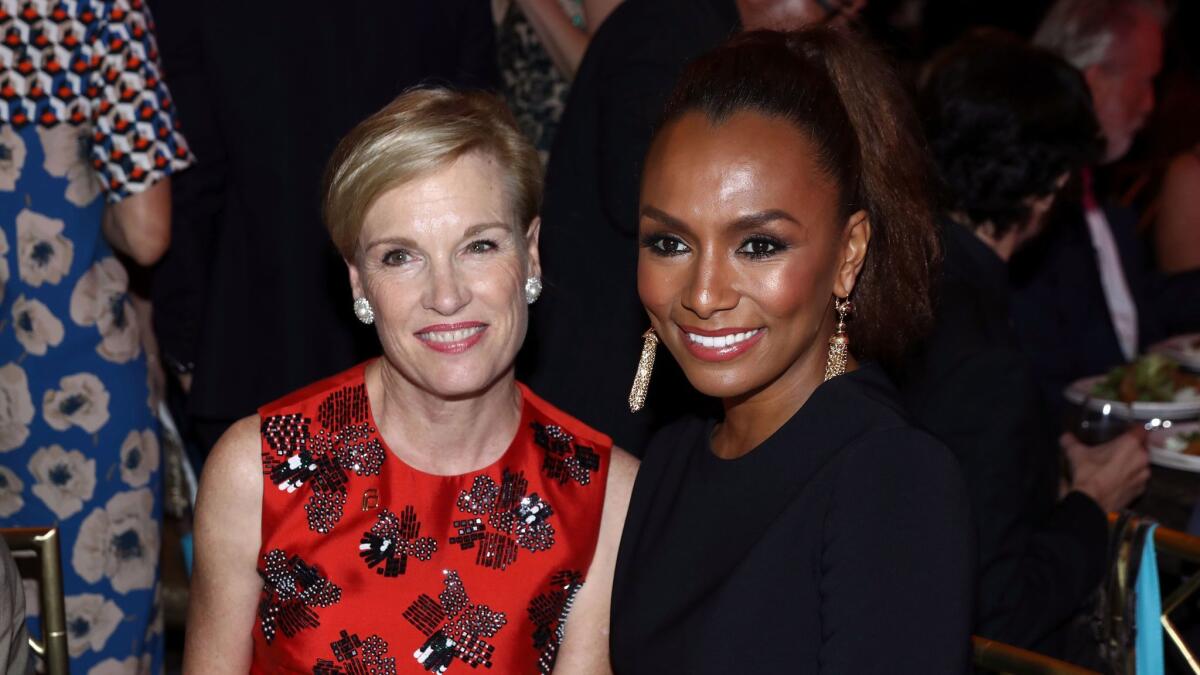The PEN Center USA awards keyed into a cultural moment

- Share via
A clean-shaven Nick Offerman kicked off the 27th annual PEN Center USA Literary Awards, held Friday night at the Beverly Wilshire Hotel, with a nod to the nonprofit’s defense of free speech and “the importance it places on the freedom for artists to express themselves.”
To wit: Should he or anyone else care to refer to the president of the United States as “an incompetent, degenerate boob” or “a cartoon slug made of Cheeto dust,” Offerman deadpanned, “PEN Center will fight for your ability to do so.”
Few honorees took him up on it, but that’s not to say the evening lacked color: The rounds of rousing acceptance speeches embodied the inspiring work for which the festival’s authors and journalists were honored. Even the “Parks and Recreation” star seemed genuinely in awe of the talent in the room, which included a number of women recognized in what feels like a cultural moment attuned to the importance of exercising — and acknowledging — their voices.

Presenting Margaret Atwood the Lifetime Achievement Award, Cecile Richards, president and chief executive of Planned Parenthood, quoted another Margaret — Margaret Sanger — before calling Atwood to the podium: “No woman can call herself free who does not own and control her body.” With “The Handmaid’s Tale” and its commentary on reproductive rights having reentered the zeitgeist so prominently, the confluence of these two women together onstage was a highlight.
For her part, Atwood underscored the necessity of PEN’s work defending freedom of expression in what she called an unprecedented time in the United States. “Democracy is best served by an open and scrupulous conversation,” said the Canadian author, a longtime PEN activist, inviting the audience to consider, speak up and take part. “What is the world we live in?” she asked. “What is the world we want to live in?”
Richards and Atwood received a standing ovation; a number of journalists also brought the room to its feet. Chelsea Handler (or, “Kellyanne Conway,” as she joked from the stage) presented New York Times reporters Megan Twohey, Jodi Kantor, Emily Steel, Michael Schmidt and Katie Benner the Freedom to Write Award for their culture-shifting reporting on sexual harassment.
Twohey, who co-wrote the New York Times story on the Harvey Weinstein scandal, said in a prerecorded speech that shifting the cultural conversation had been a reward in itself. She was bolstered “to see the ripple effect…that there were women who took to social media under the ‘me too’ hashtag to describe their personal experience with harassment and sexual assault.”

Personal experience is the foundation of memoir, and at age 34, author and transgender rights activist Janet Mock has written two, “Redefining Realness” and “Surpassing Certainty.” Sophia Amoruso, chief executive and founder of Girlboss, presented Mock PEN’s Award of Honor, which she received as “an affirmation.”
Mock described storytelling as a place of refuge from bullies during her youth in Honolulu and the significance of discovering authors like Zora Neale Hurston and Maya Angelou. Mock championed girls and women believing their own stories and mustering the courage to share them as a revolutionary act. Holding her award, she said, “let this be a reminder that you are worthy.”
Solmaz Sharif took the award in poetry for her debut collection, “Look”; her speech was galvanizing enough to prompt a “you rock!” shouted from the audience. In “Look,” Sharif repurposed military language for intimate, personal scenes: “I wrote ‘Look’ because the first casualty of war is language.”
Sharif thanked her parents for teaching her that “what you say might cost you your life and you better get on with it anyway” and she used PEN’s platform as “an occasion for a vow…to be a bane to this republic.” She added, to rueful laughter, “I will be counting on PEN Center USA to bail me out.”
Literary award winners included Martin Pousson’s “Black Sheep Boy” for fiction, Paul Kalanithi’s “When Breath Becomes Air” for creative nonfiction, Elizabeth Letts’ “The Perfect Horse” for research nonfiction and Stacey Lee’s “Outrun the Moon” for young adult literature. That final category had only three finalists after John Smelcer’s “Stealing Indians” was withdrawn after reports that he misrepresented himself as Native American.
The translation winner was Kareem James Abu-Zeid for “Confessions” by Rabee Jaber, a novel of the war in Lebanon. Guillermo del Toro and Vanessa Taylor won for their screenplay “The Shape of Water,” Thomas Schnauz for his “Better Call Saul” teleplay “Expenses” and Lisa Loomer for “Roe” for drama. The journalism award went to Eli Saslow for the Washington Post article “The White Flight of Derek Black,” about the scion of a leading white nationalist family who eventually changed his mind about race and left the movement.
More to Read
Sign up for our Book Club newsletter
Get the latest news, events and more from the Los Angeles Times Book Club, and help us get L.A. reading and talking.
You may occasionally receive promotional content from the Los Angeles Times.








